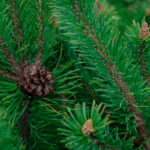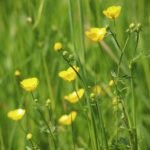Tuiki Tuiki Tähtönen – Finnish Twinkle Twinkle Little Star
Here’s another international children’s song! It’s helpful to know the tune of a song when learning the Finnish lyrics, so translated songs are useful for that.
In this article, we look at a very simple song: Twinkle Twinkle Little Star. In Finnish, the song’s name is Tuiki tuiki tähtönen. You can listen to it here or here on YouTube.
1. About the Song
Tuiki, tuiki, tähtönen (in English Twinkle, Twinkle, Little Star) is an international song. It’s a combination of a French song (Ah! Vous dirai-je, Maman) and an English poem (The Star by Jane Taylor). The Finnish lyrics to the song were made by Maisa Krokfors.
The tune of this song is also used in other Finnish songs! I will be adding the lyrics to Koska meitä kasketaan at the end of this article. The version I’m analyzing matches the English song more closely.
2. Song Lyrics of Tuiki Tuiki Tähtönen
Below you can find both the Finnish lyrics and the English lyrics. Note that these lyrics don’t match up with each other very well. You can find the literal meaning of the lyrics further below, where I’ve analyzed them.
I’m including both the first and the second verse of this song, although I must admit I’m not really familiar with the second verse.
| ♬ Finnish song lyrics ♬ | English lyrics |
|---|---|
| Tuiki, tuiki, tähtönen, iltaisin sua katselen. Korkealla loistat vaan, katsot alas maailmaan. Tuiki, tuiki tähtönen, iltaisin sua katselen. |
Twinkle, twinkle, little star How I wonder what you are Up above the world so high Like a diamond in the sky Twinkle, twinkle little star How I wonder what you are |
| Kaikki lapset maailman, tähtösiä katsovat. Miettivät miks loistaa ne, maahan asti valaisee. Kaikki lapset maailman, tähtösiä katsovat. |
When the blazing sun is gone When he nothing shines upon Then you show your little light Twinkle, twinkle, all the night Twinkle, twinkle, little star How I wonder what you are |
3. Glossary
The following grammar terms have been abbreviated.
- sg2: second person singular
- pl3: third person plural
I have marked different elements of the analysis using the following symbols.
- in italics: base word
- (in brackets): translation
- <symbol: derived from
4. Tuiki tuiki tähtönen – Finnish Song Analyzed
| Tuiki, tuiki, tähtönen, iltaisin sua katselen |
|
|---|---|
| Tuiki | tukkia (to twinkle), imperative form: “twinkle!” |
| tähtönen | star |
| iltaisin | in the evenings |
| sua | <sinua (you), in the partitive case because of katsella |
| katselen | katsella (to watch), sg1 present tense, partitive verb: [katsella + partitive] |
| Literally: Twinkle, twinkle, star, in the evenings I watch you | |
| English: Twinkle, twinkle, little star, how I wonder what you are | |
The regular word for “star” in Finnish is tähti. The word tähtönen is a derivation with the derivational element -nen. Adding -nen to create new nouns often has a deminutive function: tyttö (girl) > tyttönen (little girl). Using tähtönen in the song makes sense, because the English version has “little star”. Other possible translations for “little star” could have been “pieni tähti” or “pikkutähti“.
“Evening” in Finnish is ilta, and “in the evening” would be illalla. Adding -isin changes the meaning to “in the evenings”, plural. You can read more about adverbs ending in -isin here.
“To watch” in Finnish is usually katsoa. The verb katsella can have multiple meanings, but in this context probably means watching something for extended periods of time.
Note how the English “how you wonder what you are” doesn’t match up with the Finnish lyrics at all. This is due to the fact that this is a song: the amount of syllables is more important than the lyrics here. If we would be translating “how I wonder what you are” directly, it would say “kuinka ihmettelen mikä sinä olet“.
| Korkealla loistat vaan | |
|---|---|
| Korkealla | korkea (high), in the adessive case (millä) “up high” |
| loistat | loistaa (to shine), sg2 present tense “you shine” |
| vaan | just |
| Literally: Up high you just shine | |
| Original: Up above the world so high | |
The adjective korkea “high” is used when describing, for example, tall buildings. Adding -lla makes it an adverb which means “up high”.
The literal translation of “Up above the world so high” would be something like “Niin korkealla maailman yläpuolella“.
| katsot alas maailmaan | |
|---|---|
| katsot | katsoa (to watch), sg2 present tense “you watch, look” |
| alas | down, mihin form of alhaalla |
| maailmaan | maailma (world), mihin form “into the world” |
| Literally: You look down on the world | |
| Original: Like a diamond in the sky | |
Alhaalla, alhaalta and alas are the three possible forms (missä, mistä and mihin) of this adverb which means “down”. Alas is the mihin form, which expresses a movement towards something. When you’re watching down on something, your gaze is moving in the direction of the thing.
The word maailma is also in the mihin form in this sentence for the very same reason: the star’s gaze is moving towards the world.
The literal translation of “like a diamond in the sky” would have been “kuin timantti taivaalla“.
(Repetition of the first lines: Tuiki, tuiki, tähtönen, iltaisin sua katselen.)
| Kaikki lapset maailman tähtösiä katsovat | |
|---|---|
| Kaikki | all |
| lapset | lapsi (child), in the T-plural “the children” |
| maailman | maailma (world), in the genitive case “the world’s” |
| tähtösiä | tähtönen (star), plural partitive, object of katsoa “the stars” |
| katsovat | katsoa (to watch), pl3 present tense, partitive verb “(they) watch” |
| Literally: All the children of the world watch the stars | |
| English: When the blazing sun is gone, when he nothing shines upon | |
The word order in this section could be simplified: Kaikki maailman lapset katsovat tähtösiä. You can read more about the word kaikki and its many uses here.
The literal translation of the English lyrics would go something like: “Kun paahtava aurinko on poissa, kun se ei loista mihinkään“.
| Miettivät miks loistaa ne, maahan asti valaisee | |
|---|---|
| Miettivät | miettiä (to think), pl3 present tense “they think” |
| miks | <miksi (why), spoken language |
| loistaa | loistaa (to shine), would normally be loistavat “they shine” |
| ne | they (demonstrative pronoun) |
| maahan | maa (ground), mihin form because of asti |
| asti | up to, rection: [mihin + asti] |
| valaisee | valaista (to light, illuminate), would normally be valaisevat |
| Literally: They think why they shine, light up to the ground | |
| English: Then you show your little light, twinkle, twinkle, all the night | |
Two of the verbs in this section appear in the singular third person, but in written Finnish would actually require the plural form: Ne loistavat “they shine”, ne valaisevat “they light, illuminate”. Both are connected to ne “they”, which in this sentence means the stars.
Asti is a postposition which can be used with both the mihin form and the mistä form. In this case, the mihin form “maahan” is used to express the direction of the light: maahan asti “towards (up to) the ground”. If a light shines in the other direction, ie. away from the ground, we would say maasta asti “from the ground”. Asti can also be used when talking about time: [jouluun asti] “up until Christmas” and [joulusta asti] “from Christmas (onward)”.
(Repetition of the first lines: Kaikki lapset maailman tähtösiä katsovat.)
5. Alternative lyrics: Koska meitä käsketään
This version is an old school song, which explains the lyrics to some extent: it’s focused on learning things in school and also has multiple references to God. Listen to this version of the song here.
| ♬ Finnish song lyrics ♬ | Translated to English |
|---|---|
| Koska meitä käsketään mielehemme painamaan opetukset, jotka meitä ohjaa tiedon, taidon teitä, niin me kaiken ikämme muistissa ne pidämme. |
Because we’re ordered to commit to memory the lessons which lead us on the roads of knowledge and skills, thus we our entire life will keep them in our memory. |
| Ahkerat ja siivot me aina olla tahdomme, nöyrät myös ja kuuliaiset, Luojahamme luottavaiset, joka ain´on armostaan valmis avun antamaan. |
Hard-working and decent, we always want to be, also humble and obedient, Trusting in our creator, who is always in his grace ready to provide help. |
| Pikku taulut, kirjaset meille ovat mieluiset; niistä monet opit saamme, tuta myös Jumalaamme; tätä koulu tarkoittaa, tähän meitä kasvattaa. |
Little tablets, booklets are pleasing to us; from them we learn many lessons, also to know our God; this is what school means, that’s what we are raised for. |
So that’s the song Twinkle Twinkle Little star in Finnish! I hope you enjoyed this content. As always, you can comment with song suggestions you’d like me to cover next.




